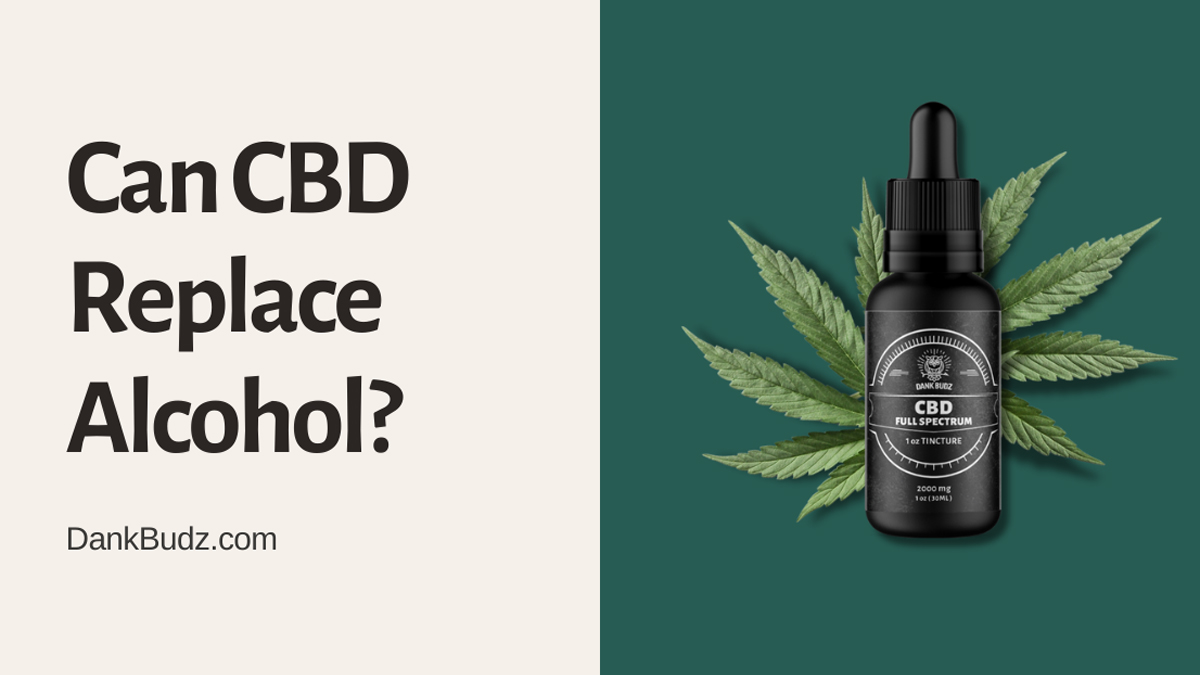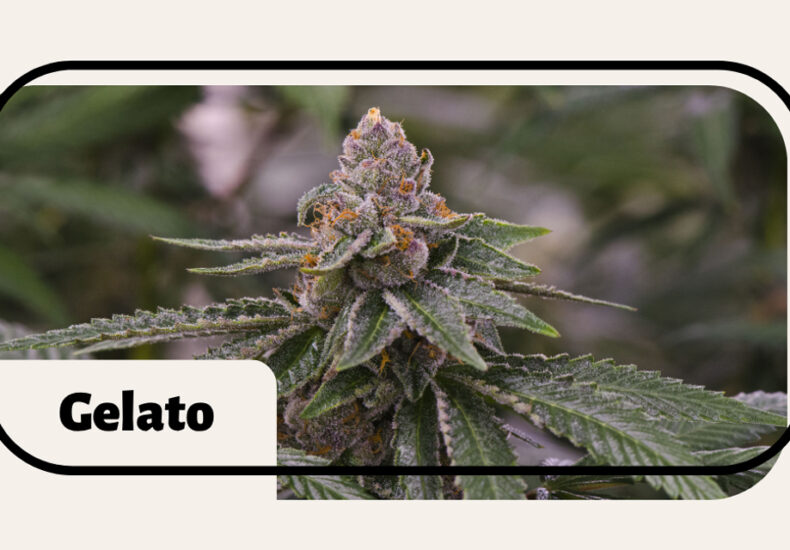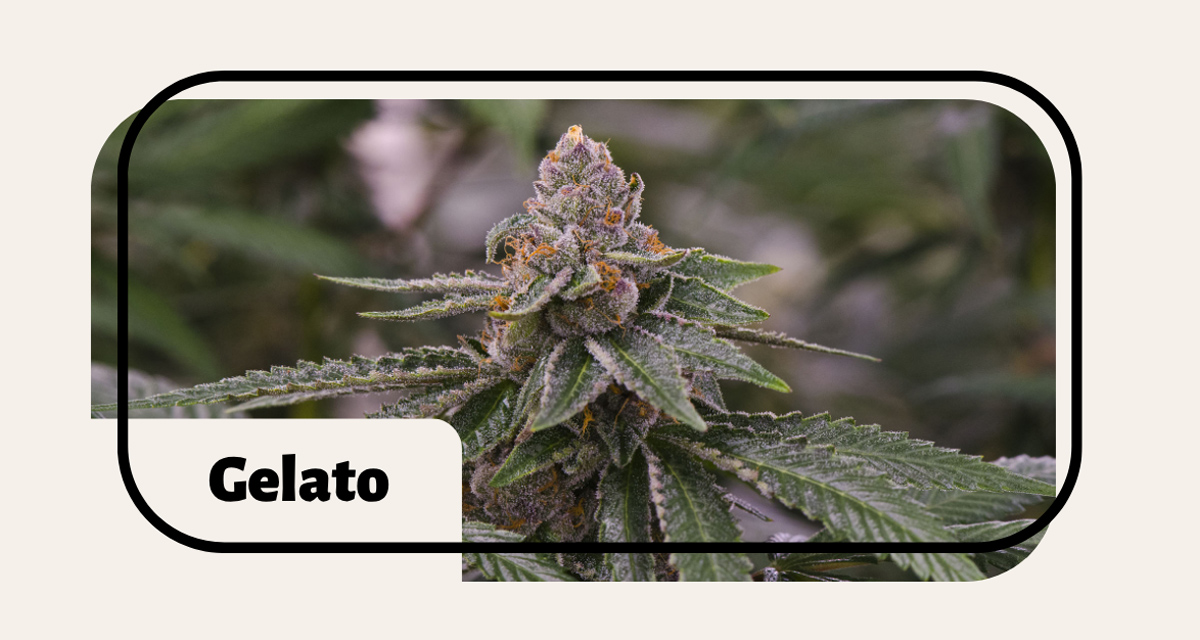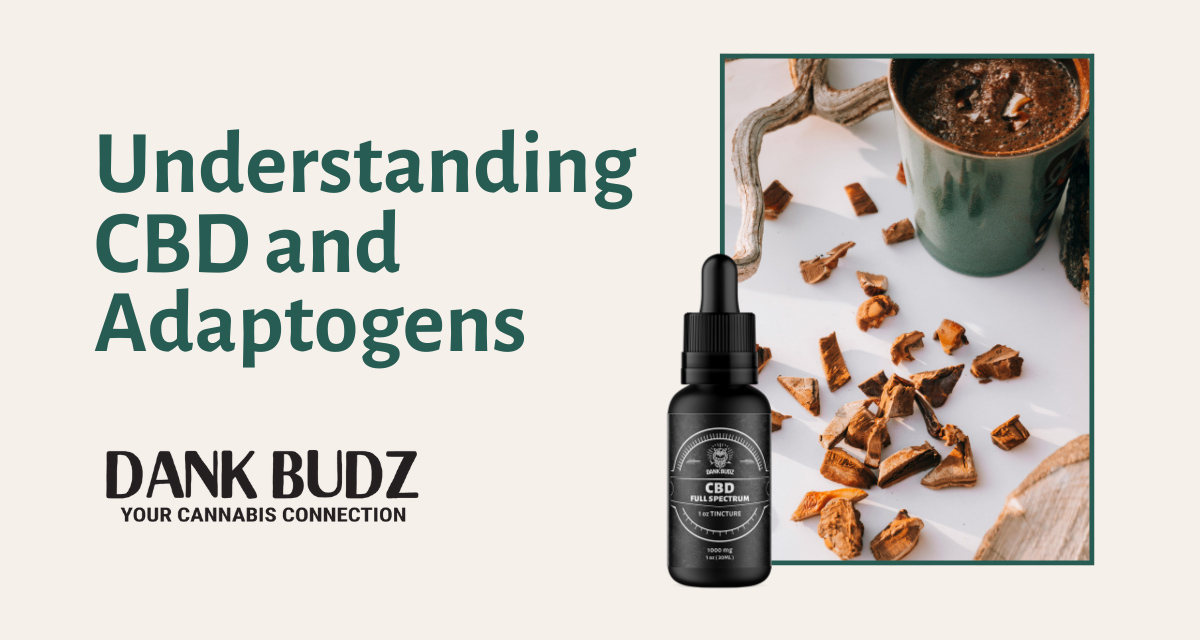
- March 25, 2025
- 4 Views
Table of Contents
ToggleWhat Are Adaptogens?
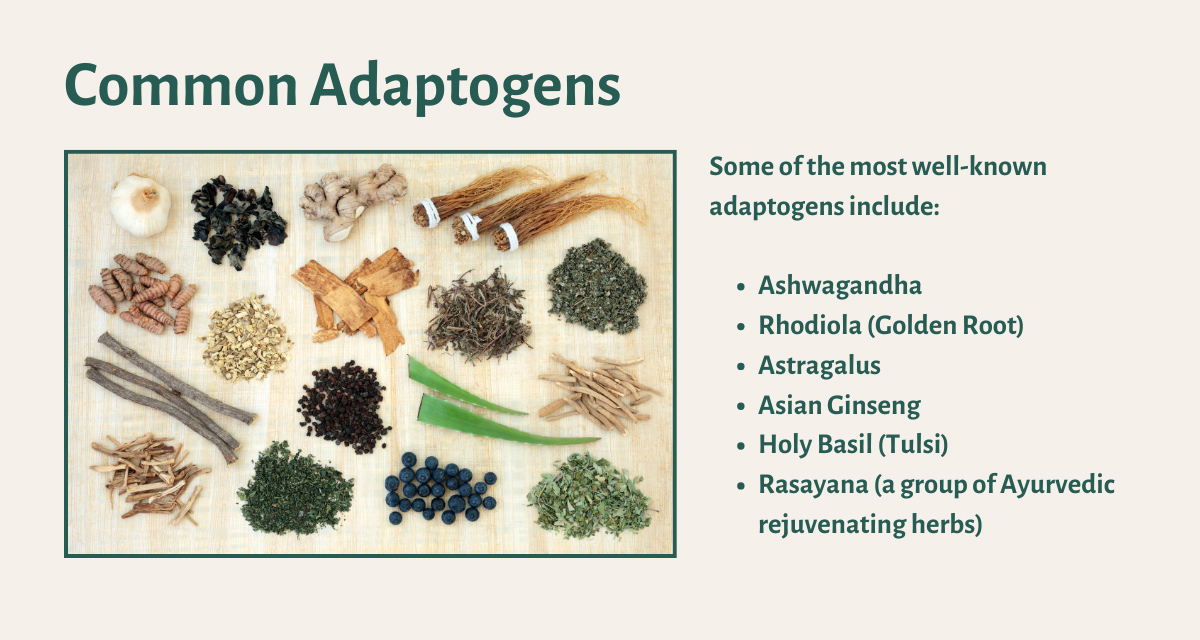 Adaptogens are natural substances, most commonly herbs, roots, or plants, that have been used in traditional and herbal medicine for centuries. Often found in Ayurvedic and Traditional Chinese Medicine, adaptogens are known for their potential to help the body resist stress, reduce fatigue, and support overall balance and well-being. According to the Cleveland Clinic, adaptogens are believed to help the body adapt to physical, chemical, or biological stressors.
These plants are often consumed as supplements, added to drinks, smoothies, or teas. However, it’s important to note that because they’re considered supplements, adaptogens are not regulated by the FDA for safety or efficacy.
Some of the most well-known adaptogens include:
Adaptogens are natural substances, most commonly herbs, roots, or plants, that have been used in traditional and herbal medicine for centuries. Often found in Ayurvedic and Traditional Chinese Medicine, adaptogens are known for their potential to help the body resist stress, reduce fatigue, and support overall balance and well-being. According to the Cleveland Clinic, adaptogens are believed to help the body adapt to physical, chemical, or biological stressors.
These plants are often consumed as supplements, added to drinks, smoothies, or teas. However, it’s important to note that because they’re considered supplements, adaptogens are not regulated by the FDA for safety or efficacy.
Some of the most well-known adaptogens include:
- Ashwagandha
- Rhodiola (also known as Golden Root)
- Astragalus
- Asian Ginseng
- Holy Basil (Tulsi)
- Rasayana (a group of Ayurvedic rejuvenating herbs)
Adaptogens and the HPA Axis
The hypothalamic-pituitary-adrenal (HPA) axis is a vital neuroendocrine system that helps regulate how the body responds to stress. When you experience a stressful situation or environmental change, the HPA axis works alongside other systems to release hormones, most notably, cortisol, often referred to as the “stress hormone” NIH. This hormonal surge temporarily pulls the body out of homeostasis, triggering familiar physical and emotional stress responses such as fatigue, low energy, increased heart rate, and mood changes. While this is a natural short-term response, staying in a prolonged state of stress can be harmful. Research shows that chronic activation of the HPA axis contributes to the development of serious health issues, including anxiety disorders, cardiovascular disease, and metabolic conditions National Institutes of Health (NIH). Adaptogens are believed to play a supportive role in regulating the HPA axis and helping the body return to balance. By influencing chemical pathways involved in stress responses, adaptogens may help reduce fatigue, lower cortisol levels, ease mental exhaustion, and improve sleep quality. This ability to promote homeostasis is what makes adaptogens a popular natural option for managing daily stress.Understanding CBD
 The growing interest in cannabidiol (CBD) for stress relief, anxiety management, and overall wellness raises the question: Could CBD be considered an adaptogen?
To explore that, it helps to first understand what CBD is.
CBD is a cannabinoid, one of over a hundred naturally occurring compounds found in the cannabis plant. These compounds are known for their ability to interact with cannabinoid receptors in the brain and body. Interestingly, cannabinoids aren’t unique to cannabis. Other plants like echinacea, kava, and certain teas also contain similar compounds known as phytocannabinoids. Additionally, the human body produces its own version, called endocannabinoids, which help regulate essential physiological functions National Cancer Institute.
Cannabis itself is widely recognized for its psychoactive effects, but it’s important to note that these effects are primarily caused by THC (delta-9-tetrahydrocannabinol), a separate cannabinoid responsible for the “high” associated with marijuana use. In contrast, CBD is non-psychoactive, meaning it does not produce that intoxicating effect Harvard Health.
Commercial CBD products are typically extracted from industrial hemp, which, by U.S. law, contains less than 0.3% THC. While the FDA regulates cannabis-derived THC products, CBD itself is not classified as a controlled substance and is legal for use across the United States, provided it stays within THC limits, per the Alcohol and Drug Foundation.
Originally, CBD gained attention for its role in treating rare forms of childhood epilepsy. Today, it’s become a popular wellness supplement, especially for managing anxiety, chronic pain, and inflammation. There’s also growing interest in its potential to support better sleep and promote relaxation Harvard Health.
CBD is available in a variety of forms, including oils, gummies, vapes, patches, capsules, tinctures, and topical creams designed to reduce inflammation and support recovery.
The growing interest in cannabidiol (CBD) for stress relief, anxiety management, and overall wellness raises the question: Could CBD be considered an adaptogen?
To explore that, it helps to first understand what CBD is.
CBD is a cannabinoid, one of over a hundred naturally occurring compounds found in the cannabis plant. These compounds are known for their ability to interact with cannabinoid receptors in the brain and body. Interestingly, cannabinoids aren’t unique to cannabis. Other plants like echinacea, kava, and certain teas also contain similar compounds known as phytocannabinoids. Additionally, the human body produces its own version, called endocannabinoids, which help regulate essential physiological functions National Cancer Institute.
Cannabis itself is widely recognized for its psychoactive effects, but it’s important to note that these effects are primarily caused by THC (delta-9-tetrahydrocannabinol), a separate cannabinoid responsible for the “high” associated with marijuana use. In contrast, CBD is non-psychoactive, meaning it does not produce that intoxicating effect Harvard Health.
Commercial CBD products are typically extracted from industrial hemp, which, by U.S. law, contains less than 0.3% THC. While the FDA regulates cannabis-derived THC products, CBD itself is not classified as a controlled substance and is legal for use across the United States, provided it stays within THC limits, per the Alcohol and Drug Foundation.
Originally, CBD gained attention for its role in treating rare forms of childhood epilepsy. Today, it’s become a popular wellness supplement, especially for managing anxiety, chronic pain, and inflammation. There’s also growing interest in its potential to support better sleep and promote relaxation Harvard Health.
CBD is available in a variety of forms, including oils, gummies, vapes, patches, capsules, tinctures, and topical creams designed to reduce inflammation and support recovery.
How CBD Works in the Body
Like adaptogens, CBD is often associated with helping the body achieve homeostasis, a state of internal balance. This is one reason many people turn to CBD products for stress relief and anxiety management. However, it’s important to understand that CBD and other cannabinoids don’t interact with the body’s HPA axis like traditional adaptogens. Instead, they work within a distinct system known as the endocannabinoid system (ECS). The ECS is a complex cell-signaling system that plays a key role in regulating cognitive and emotional responses, including stress pathways, pain perception, mood, appetite, immune function, and sleep cycles, per the Alcohol and Drug Foundation. When the body is exposed to chronic stress, poor diet, or illness, the ECS can become dysregulated, which may contribute to problems with cognitive function, immunity, digestion, and the nervous system, per Harvard Health. Cannabinoids like CBD interact with cannabinoid receptors (CB1 and CB2) located on the surface of cells throughout the brain and body. Unlike THC, which binds directly to these receptors, CBD modulates receptor activity, influencing how these receptors respond to other chemical signals. According to research, this may allow CBD to help stabilize the ECS, reducing stress and anxiety symptoms, supporting emotional balance, and promoting overall well-being, per the NIH. By supporting the ECS, CBD may indirectly assist the body in returning to homeostasis, contributing to better stress management, reduced inflammation, and improved mental clarity.Does CBD Meet the Criteria of an Adaptogen?
 Like many adaptogenic herbs, cannabis has a long history of medicinal use across various cultures. Since CBD is a plant-derived compound, it raises an important question: Can CBD be classified as an adaptogen?
According to the Cleveland Clinic, in order to qualify as a natural adaptogen, a plant, herb, or root must generally meet three key criteria:
Like many adaptogenic herbs, cannabis has a long history of medicinal use across various cultures. Since CBD is a plant-derived compound, it raises an important question: Can CBD be classified as an adaptogen?
According to the Cleveland Clinic, in order to qualify as a natural adaptogen, a plant, herb, or root must generally meet three key criteria:
- Non-Toxicity: It should not be toxic when consumed in normal amounts. Stress Management: It should help the body manage stress.
- Homeostasis Support: It should support the body’s ability to return to balance, or homeostasis.
Both CBD and Adaptogens Are Natural
Adaptogens are plant-based, derived from herbs and roots. Similarly, CBD is extracted from the hemp plant, a member of the cannabis family. Both are generally considered non-toxic when consumed in recommended amounts, as noted by Harvard Health.Both Mitigate Stress and Anxiety
Both CBD and adaptogens are valued for their therapeutic effects, specifically their ability to reduce stress and anxiety symptoms. They may also help alleviate fatigue, manage pain, and promote better sleep quality, according to the National Cancer Institute.Both Support Homeostasis
While CBD and adaptogens act on different systems, both help the body achieve homeostasis, the state of internal balance essential for health and well-being. Adaptogens primarily influence the hypothalamic-pituitary-adrenal (HPA) axis, which regulates the body’s stress response. In contrast, CBD interacts with the endocannabinoid system (ECS), a complex network responsible for regulating mood, immune response, pain, and more. Despite working through separate biological pathways, both contribute to restoring balance within the body, helping manage stress and support overall wellness, as noted by the National Institutes of Health (NIH).How CBD Complements Traditional Adaptogens
While CBD and traditional adaptogens share similar benefits, their mechanisms of action differ. As noted earlier, adaptogens influence the HPA axis, while CBD interacts with the endocannabinoid system (ECS), each playing distinct roles in how the body responds to stress. What makes CBD interesting is that, despite these differences, it offers adaptogenic-like effects. Some wellness experts suggest that combining CBD with traditional adaptogens could enhance the stress-relieving and balancing benefits of both. CBD may offer immediate relief from anxiety and tension, while adaptogens work gradually to build long-term resilience. Together, they could support better stress management, improved sleep, emotional balance, and overall well-being.Benefits of CBD when Used Like an Adaptogen
 Even though CBD and adaptogens act through different systems in the body, they often produce similar effects. When used like an adaptogenic supplement, CBD may offer several potential wellness benefits:
Even though CBD and adaptogens act through different systems in the body, they often produce similar effects. When used like an adaptogenic supplement, CBD may offer several potential wellness benefits:
Stress Relief and Anxiety Reduction
CBD is widely recognized for its potential to ease stress and anxiety. According to a 2023 study published by the NIH, self-reported CBD users rated products as “highly effective” for stress reduction. Additional studies show CBD may serve as a novel therapeutic option for anxiety disorders, helping reduce symptoms and improve overall emotional balance, as noted by the National Institutes of Health (NIH).Anti-Inflammatory and Relaxation Properties
CBD is also known for its anti-inflammatory properties. According to the National Institutes of Health (NIH), CBD may reduce levels of pro-inflammatory cytokines in the body, which can help lower pain and mitigate the long-term impacts of chronic stress and disease.Support for Sleep and Mental Clarity
Research suggests CBD may promote better sleep quality, which is essential for mental clarity and emotional well-being. A 2022 study on insomnia published by the NIH found that CBD use led to significant improvements in sleep among participants suffering from insomnia. Improved sleep is directly linked to better focus, mood regulation, and productivity.Should You Use CBD Like an Adaptogen?
Having a better idea of what CBD is and how it relates to other substances like herbal adaptogens, long valued for their potential healing properties, may have you considering whether to add CBD products to your wellness routine. Based on its potential benefits, including stress and anxiety relief, mood improvement, better sleep, mental clarity, and anti-inflammatory effects, CBD is worth exploring as a natural way to support overall well-being. When it comes to dosing, there are currently no specific guidelines provided by the U.S. Food and Drug Administration (FDA). However, according to the UK Food Standards Agency (FSA), healthy adults are advised to limit CBD intake to no more than 10 mg per day from food or supplements due to ongoing safety research. As noted by the BBC, experts also warn that high doses of CBD may pose health risks, including potential liver damage and side effects such as nausea, irritability, dry mouth, and fatigue. Because everyone’s body responds differently, it’s best to start with a low dose and adjust slowly while monitoring how you feel. If you’re taking medications or managing a health condition, consulting a healthcare professional is strongly recommended to avoid potential interactions. For those new to CBD, exploring trusted CBD retailers or wellness experts can provide helpful education and guidance on finding the right CBD products and dosages for your needs.Blending CBD and Adaptogens for Optimal Wellness
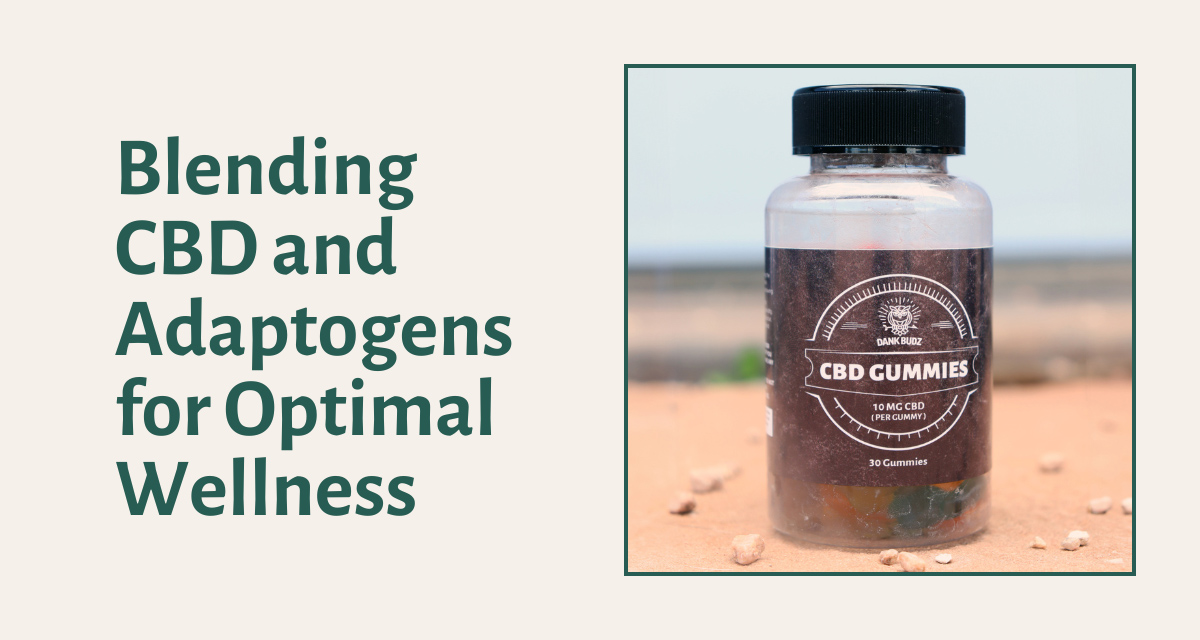 Both adaptogens and CBD share similar qualities and have been used throughout history for their medicinal and therapeutic properties. While CBD demonstrates adaptogenic-like effects, it is not technically classified as a traditional adaptogen, as the two act on different regulatory systems within the body.
Still, it’s worth exploring the growing body of research supporting CBD’s potential benefits, including its role in reducing stress and anxiety, decreasing inflammation, and improving sleep quality. Like adaptogens, CBD may help the body achieve homeostasis, restoring balance and supporting overall well-being.
Ultimately, the question isn’t whether CBD or adaptogens are better. Instead, it’s about discovering what works best for your body and unique needs. For many, a combination of both may provide the most comprehensive support for stress management, mood regulation, and overall health.
Both adaptogens and CBD share similar qualities and have been used throughout history for their medicinal and therapeutic properties. While CBD demonstrates adaptogenic-like effects, it is not technically classified as a traditional adaptogen, as the two act on different regulatory systems within the body.
Still, it’s worth exploring the growing body of research supporting CBD’s potential benefits, including its role in reducing stress and anxiety, decreasing inflammation, and improving sleep quality. Like adaptogens, CBD may help the body achieve homeostasis, restoring balance and supporting overall well-being.
Ultimately, the question isn’t whether CBD or adaptogens are better. Instead, it’s about discovering what works best for your body and unique needs. For many, a combination of both may provide the most comprehensive support for stress management, mood regulation, and overall health.
References:
- Cleveland Clinic. (2023). What are adaptogens? Cleveland Clinic. Retrieved from https://my.clevelandclinic.org/health/drugs/22361-adaptogens
- Harvard Health Publishing. (2018, August 24). Cannabidiol (CBD): What we know and what we don’t. Harvard Health Blog. Retrieved from https://www.health.harvard.edu/blog/cannabidiol-cbd-what-we-know-and-what-we-dont-2018082414476
- Panossian, A., & Wikman, G. (2010). Effects of adaptogens on the central nervous system and the molecular mechanisms associated with their stress—Protective activity. Current Clinical Pharmacology, 5(3), 198–219. https://www.ncbi.nlm.nih.gov/pmc/articles/PMC3991026/
- Panossian, A., & Wikman, G. (2010). Effects of adaptogens on the central nervous system and the molecular mechanisms associated with their stress-protective activity. Current Clinical Pharmacology, 5(3), 198–219. https://www.ncbi.nlm.nih.gov/pmc/articles/PMC3991026/
- Cleveland Clinic. (2023). Hypothalamic-pituitary-adrenal (HPA) axis. Cleveland Clinic. Retrieved from https://my.clevelandclinic.org/health/articles/22187-hypothalamic-pituitary-adrenal-axis
- Panossian, A., & Wikman, G. (2010). Effects of adaptogens on the central nervous system and the molecular mechanisms associated with their stress-protective activity. Current Clinical Pharmacology, 5(3), 198–219. https://www.ncbi.nlm.nih.gov/pmc/articles/PMC3991026/
- Alcohol and Drug Foundation. (2023). Cannabidiol (CBD). Retrieved from https://adf.org.au/drug-facts/cannabidiol/
- Harvard Health Publishing. (2021, April 8). CBD products are everywhere. But do they work? Harvard Health Blog. Retrieved from https://www.health.harvard.edu/staying-healthy/cbd-products-are-everywhere-but-do-they-work
- Urits, I., Borchart, M., Hasegawa, M., Kochanski, J., Orhurhu, V., Viswanath, O., & Cornett, E. M. (2021). An Update of Current Cannabis-Based Pharmaceuticals in Pain Medicine. Journal of Clinical Medicine, 10(4), 708. https://www.ncbi.nlm.nih.gov/pmc/articles/PMC9899821/
- Harris, R. E., Winter, S. S., & Beatty, C. T. (2023). Cannabidiol use and effectiveness: Real-world evidence from a self-report survey. Medical Cannabis and Cannabinoids, 6(1), 1-9. https://pmc.ncbi.nlm.nih.gov/articles/PMC10629851/
- Linares, I. M., Zuardi, A. W., Pereira, L. C., Queiroz, R. H. C., Mechoulam, R., Guimarães, F. S., & Crippa, J. A. (2020). Cannabidiol presents an inverted U-shaped dose-response curve in a simulated public speaking test. Brazilian Journal of Psychiatry, 42(3), 271-276. https://pmc.ncbi.nlm.nih.gov/articles/PMC7480724/
- Nichols, J. M., & Kaplan, B. L. F. (2020). Immune responses regulated by cannabidiol. Cannabis and Cannabinoid Research, 5(1), 12-31. https://pmc.ncbi.nlm.nih.gov/articles/PMC7023045/
- Fernandes, S. S., de Melo, F. C. S. A., de Siqueira, G. G., de Oliveira, L. L., & Rosa, P. B. (2022). Cannabidiol and insomnia: A systematic review. Sleep Medicine Reviews, 66, 101689. https://pubmed.ncbi.nlm.nih.gov/36149724/
- BBC News. (2023, October 13). CBD oil: Watchdog recommends healthy adults limit use to 10mg per day. BBC News. Retrieved from https://www.bbc.com/news/health-67087470
- Advisory Committee on Novel Foods and Processes (ACNFP) & Committee on Toxicity (COT). (2023). Joint position paper from ACNFP & COT on establishing provisional ADI for pure form CBD in foods. UK Food Standards Agency (FSA). Retrieved from https://acnfp.food.gov.uk/JointpositionpaperfromACNFP%26COTonestablishingprovisionalADIforpureformCBDinfoods
Author
Jenny Stradling
Jenny Weatherall, co-owner and founder of Dank Budz, is a respected voice in cannabis education and a pioneer in digital marketing. With over 20 years of experience, Jenny has written thousands of well-researched articles in the health and wellness space, combining her passion for education with her commitment to accuracy and accessibility.
As the CEO of Eminent SEO since 2005, she has worked tirelessly to improve the web, making information more transparent and reliable for readers worldwide. Through Dank Budz, Jenny focuses on debunking cannabis myths, promoting its many health benefits, and advocating for legalization and responsible consumption. Her dedication to creating high-quality, evidence-based content ensures her audience can trust the resources she provides.
Read More About Jenny | See All of Jenny's Posts
